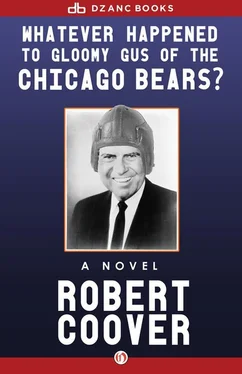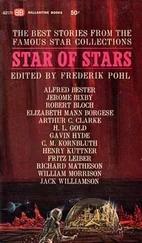Robert Coover - Whatever Happened to Gloomy Gus of the Chicago Bears?
Здесь есть возможность читать онлайн «Robert Coover - Whatever Happened to Gloomy Gus of the Chicago Bears?» весь текст электронной книги совершенно бесплатно (целиком полную версию без сокращений). В некоторых случаях можно слушать аудио, скачать через торрент в формате fb2 и присутствует краткое содержание. Год выпуска: 2014, Издательство: Dzanc Books, Жанр: Современная проза, на английском языке. Описание произведения, (предисловие) а так же отзывы посетителей доступны на портале библиотеки ЛибКат.
- Название:Whatever Happened to Gloomy Gus of the Chicago Bears?
- Автор:
- Издательство:Dzanc Books
- Жанр:
- Год:2014
- ISBN:нет данных
- Рейтинг книги:4 / 5. Голосов: 1
-
Избранное:Добавить в избранное
- Отзывы:
-
Ваша оценка:
- 80
- 1
- 2
- 3
- 4
- 5
Whatever Happened to Gloomy Gus of the Chicago Bears?: краткое содержание, описание и аннотация
Предлагаем к чтению аннотацию, описание, краткое содержание или предисловие (зависит от того, что написал сам автор книги «Whatever Happened to Gloomy Gus of the Chicago Bears?»). Если вы не нашли необходимую информацию о книге — напишите в комментариях, мы постараемся отыскать её.
Whatever Happened to Gloomy Gus of the Chicago Bears? — читать онлайн бесплатно полную книгу (весь текст) целиком
Ниже представлен текст книги, разбитый по страницам. Система сохранения места последней прочитанной страницы, позволяет с удобством читать онлайн бесплатно книгу «Whatever Happened to Gloomy Gus of the Chicago Bears?», без необходимости каждый раз заново искать на чём Вы остановились. Поставьте закладку, и сможете в любой момент перейти на страницу, на которой закончили чтение.
Интервал:
Закладка:
Over the months that followed, he continued his exercises, expanding them to include new techniques picked up from coaches, friends, movies, books, teammates, barbershops, parents, and burlesque shows in Los Angeles. He learned how — each in separate drills — to tackle and block, swear vehemently, break out of a huddle, cradle a ball, throw it and catch it and inflate it, how to squeeze hands, caress them, gaze deeply, joke casually, wink, blow loose wisps of hair back, ask for a phone number, stand tall, and even foxtrot a bit. Not without paying a price, of course. Something had to go to make room for all of this. He was able to compress some practice times, once he’d mastered a given skill, but he discovered he could not omit any drill altogether or the skills slipped away from him again. Even the offside practice: he got it down to about two minutes a day, but he couldn’t get rid of it. And one skill did not simply lead to another — more often it led to a dozen, and each of these dozen to a dozen each, multiplying like leaves on a fast-branching tree. I could understand his dilemma. I have the same problem with my sculpting: I can never hope to catch up. I’m afraid we had a lot in common, Gloomy Gus and I, more than I’ve sometimes wished to admit. I’ve said we simplified ourselves — but didn’t we merely substitute a vertical madness for a horizontal one?
Moreover, in Gus’s case, the various responses with which opposing teams and girls might confront him were virtually infinite — relatively, with my inert bits of metal, I have it easy — and, lacking any instinct for either discipline, he had to learn them all, one by one, and then memorize counter-moves, a stupendous task that only one as disciplined as Gloomy Gus could ever have undertaken. It was made all the more complex by his belief (or maybe it was instinct, same source as the offside lurch) in the surprise counterattack as the only possible reply: “You cannot win a battle in any arena of life merely by defending yourself.” He felt that, since girls and football teams are “not intelligent, but stupid, it is important whenever possible to confront them with an unexpected maneuver.” There’s a famous maxim, attributed to him, on the subject: “Take the offensive, show no fear, do the unexpected, but do nothing rash!” But since all his moves were studied out and practiced, how could they be surprises? This became his master task: to make the response mechanism so intricate that the patterns were invisible. A million new drills, then, and to make room for them, he had to abandon his music, fraternity, edifying outside reading, hamburger-grinding, presidency of Christian Endeavor, baseball and tennis, oratory, school newspaper editorship, friendly conversations, and Latin club. Though he cut back sharply on the time spent on acting and debate, he clung to them, as well as to his campus politics and studies, the latter because he had to pass his courses to stay in school and play football, the others because they doubled as verbal calisthenics for lockerroom banter and picking up new girls.
While to the casual observer the results of all this rigor and sacrifice may not have been spectacular, they were nevertheless impressive enough. Before classes had begun next fall, to the surprise of the coach he had made the varsity football squad, and to the surprise of the head cheerleader had gently sucked her left pap. In fact, he had sucked it three times in succession, starting from scratch with the wink, pickup, and handholding each time through, and all she could think of to say was: “Don’t you like the other one?” “He looked so surprised,” she said after, “that I don’t think he knew there was another one.” On the football field he was neither brilliant nor imaginative, but he was consistent. The coach still didn’t trust him in the backfield, but he did let him play right end in the second half of the fourth game of the season. He did well, staying onside until the ball was centered, taking out his man, throwing textbook blocks, and running convincing decoys, until on about the seventh or eighth play he was thrown a pass. He floated far out on the right flank, shook off his opponent, sprinted downfield, turned at just the right moment, leaped gracefully, and made a phenomenal catch of a wobbling, overthrown pass — the students and fans in the stands went wild. But when he came down, he just stood there, smiling blankly. For a moment, everybody on the field was like that, stopped dead, staring at him, dumbfounded. Then they hit him. So hard in fact that he fumbled the ball, the opponents recovering. Once again, they had to carry him off.
“What the hell happened?” cried the coach as they carried him by, in pain but still smiling.
“I couldn’t remember what came next, Chief,” he said.
The coach was nearly crying, but what he said was: “Y’know, if they’d had more guys like you in the cavalry, maybe we wouldn’ta been the ones to end up on the goddamn reservations!”
“Gosh… thanks, Coach…”
Gus, when he was able, went back to the practice field. Fields. He no longer had time for campus politics, little theater, or debate society. Every minute in his daily timetable not used for eating, sleeping, toilet, and classwork went into learning everything there was to know about girls and football. He’d had an experience with a girl from his chemistry class much like the one he’d had on the football field: he’d got her skirts up all right and knew what the equivalent of a touchdown was, but he’d forgotten to practice getting an erection. He’d expanded his practice schedule, apparently determined never to let these things happen again, although his brother said he didn’t think it was determination. He thought it was more like grabbing a tiger’s tail: no conscious decisions, just one desperate thing after another. “One fact you oughta understand,” he told me as we sat in my back room looking through the scrapbook (he’d turned down a cup of coffee after seeing the condition of my pot), “when Dick was three years old he fell out of a buggy and the iron wheel ran over his head — he’s got a scar from the top of his forehead to the back of his neck from it.” The brother’s suspicion that Gus wasn’t all there I shared, but I didn’t think the bump had anything to do with it.
Whatever moved him — his own inspiration or mere mechanics — he set about to master the two arts once and for all. He not only drilled himself on all aspects of offense and defense, of foreplay and conquest, but he also had practice sessions on how to jog out onto the field, spit water during time-outs, laugh at the coach’s jokes, and crack bare butts with wet towels in the showerroom (his brother balked at practicing this one with him, and even his mother’s Christian forbearance failed her before he’d got the knack), how to compliment girls’ private parts politely in public, avoid entangling alliances, take a slap, test condoms, dance the Charleston, and recognize jazz-babies, red-hot mamas, and virgins by the way they walked. By the time the football season rolled around his junior year, he’d been named the second-string right halfback by the coach of the Whittier Poets and jerked off by the captain of the women’s volleyball team, both of whom admitted later to a lot of preliminary soul-searching.
The only remarkable thing about the first few games of that 1932 season was that nothing went radically wrong. Drills and exercises were one thing, real games were another, and Gus hadn’t put it all together yet, but he had set aside seventy-five minutes a day with three hours extra on weekends for what he called “meshing sessions,” and by the fourth or fifth game it was all beginning to fall into place. He wasn’t fast as a runner, but he was nimble, deceptive, and hard-hitting, a tricky man to bring down. His pass reception was surefingered, if a bit stiff in its orthodoxy, and his defensive play was sometimes crude but always effective. He could pass when he had to (though he didn’t seem to like releasing the ball once he had it in his hands — sometimes people even had to take it away from him to center it for the next play), and he was very impressive at reading offensive plays of the opponent, slapping butts in huddles, and coming on and off the field. Finally, after a lot of soul-searching, the coach decided to start him for the Homecoming Game.
Читать дальшеИнтервал:
Закладка:
Похожие книги на «Whatever Happened to Gloomy Gus of the Chicago Bears?»
Представляем Вашему вниманию похожие книги на «Whatever Happened to Gloomy Gus of the Chicago Bears?» списком для выбора. Мы отобрали схожую по названию и смыслу литературу в надежде предоставить читателям больше вариантов отыскать новые, интересные, ещё непрочитанные произведения.
Обсуждение, отзывы о книге «Whatever Happened to Gloomy Gus of the Chicago Bears?» и просто собственные мнения читателей. Оставьте ваши комментарии, напишите, что Вы думаете о произведении, его смысле или главных героях. Укажите что конкретно понравилось, а что нет, и почему Вы так считаете.












